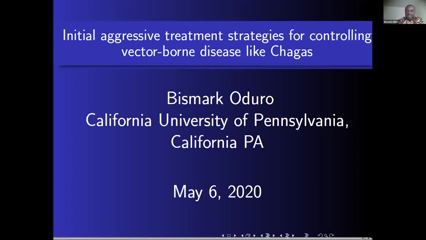MBI Videos
Bismark Oduro
-
 Bismark OduroChagas disease is a major health problem in rural South and Central America where an estimated 8 to 11 million people are infected. It is a vector-borne disease caused by the parasite Trypanosoma cruzi, which is transmitted to humans mainly through the bite of insect vectors from several species of so-called kissing bugs. One of the control measures to reduce the spread of the disease is insecticide spraying of housing units to prevent infestation by the vectors. However, re-infestation of units by vectors has been shown to occur as early as four to six months after insecticide-based control interventions. I will present ordinary differential
Bismark OduroChagas disease is a major health problem in rural South and Central America where an estimated 8 to 11 million people are infected. It is a vector-borne disease caused by the parasite Trypanosoma cruzi, which is transmitted to humans mainly through the bite of insect vectors from several species of so-called kissing bugs. One of the control measures to reduce the spread of the disease is insecticide spraying of housing units to prevent infestation by the vectors. However, re-infestation of units by vectors has been shown to occur as early as four to six months after insecticide-based control interventions. I will present ordinary differential
equation models of type SIRS that shed light on long-term cost effectiveness of certain strategies for controlling re-infestation by vectors. The results show that an initially very high spraying rate may push the system into a region of the state space with low endemic levels of infestation that can be maintained in the long run at relatively moderate cost.
